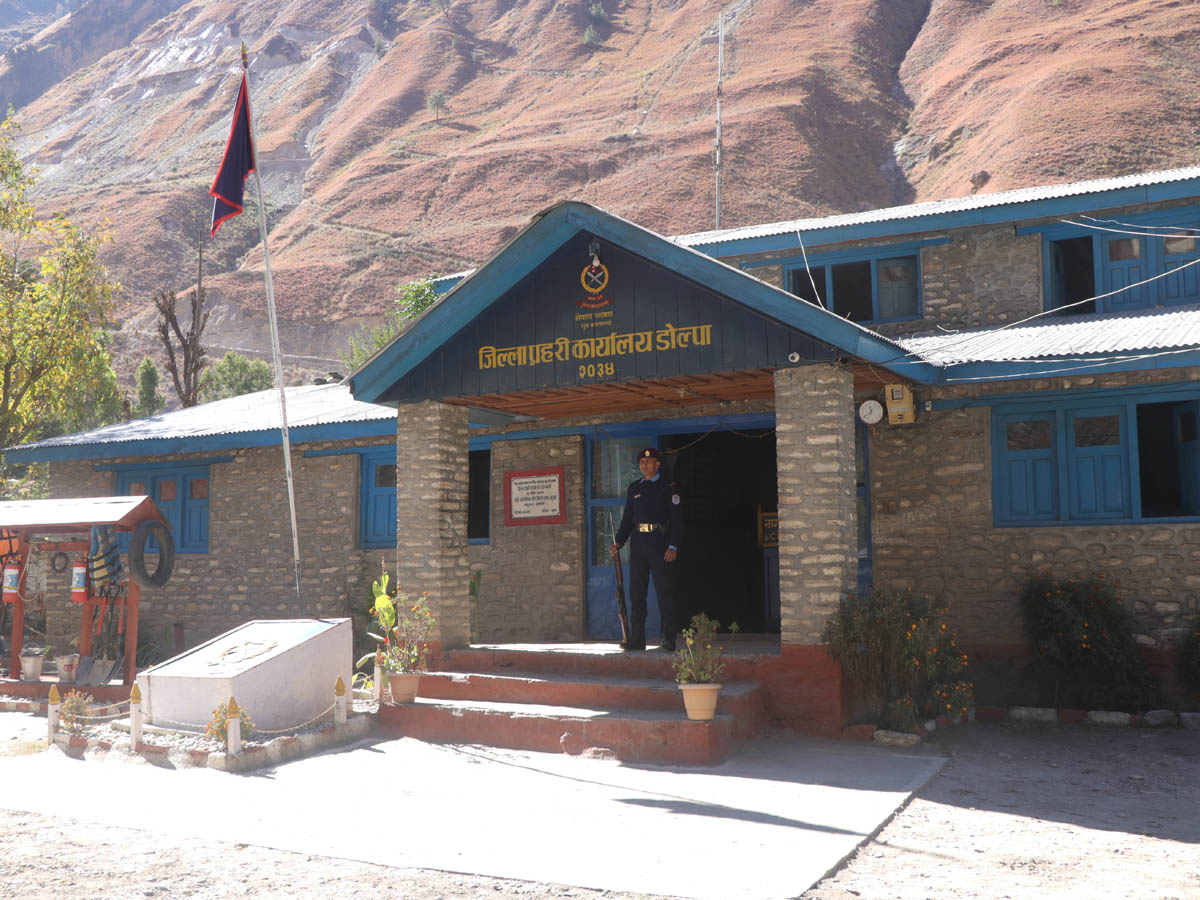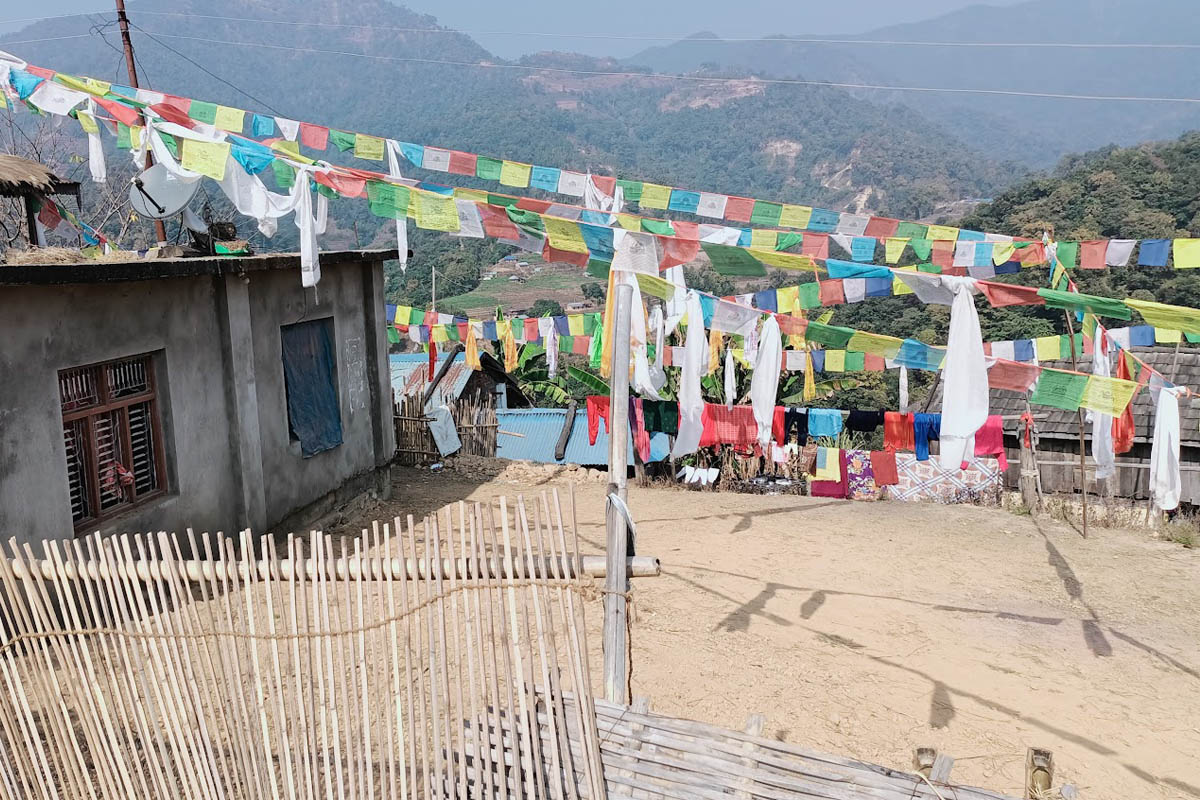Namita Badi (name changed) was just 16 years old when she was rescued in 2016 from a bar in Pune, India where she had been working for the past two years. She had left her home in Satti a few years back with her parents and reached Mumbai from Tikunia via Mathura. “I was left with no choice but to follow my family and do what was expected of me. Initially, I started doing some labor work but since it began getting difficult to sustain, I got into sex work,” she shares. After she was rescued, Namita was kept for a few months in a shelter home of Maiti Nepal before being brought to Satti.
 In 2018, following her mother’s death, Namita found herself with no alternative but to return to India and engage in sex work. When the Covid-19 pandemic struck, there was no turning back. Being part of a community where sex work is a means of survival, it has become commonplace for parents to compel their young daughters into this profession, whether willingly or forcibly. “Once ensnared, escape is next to impossible; a quagmire that tightens its grip, leaving one weak in their knees,” Namita’s words echo the harsh reality faced by many in similar circumstances.
In 2018, following her mother’s death, Namita found herself with no alternative but to return to India and engage in sex work. When the Covid-19 pandemic struck, there was no turning back. Being part of a community where sex work is a means of survival, it has become commonplace for parents to compel their young daughters into this profession, whether willingly or forcibly. “Once ensnared, escape is next to impossible; a quagmire that tightens its grip, leaving one weak in their knees,” Namita’s words echo the harsh reality faced by many in similar circumstances.
Malati Badi (name changed) is living the aftermath of an unpleasant past she says her parents were responsible for. She was 12 when she saw the dazzling markets in India. She was with her aunt then who later sold her to a man from a remote area, where she was rescued from.
Despite five years into the marriage now, she still is not sure whether her husband is willing to get her a citizenship certificate through his own. Malati shares that when she tries to remember her family members, the only memories that keep flooding back are the episodes of torture she had to go through at a tender age of 12 – being trafficked and sold to a man in India by her aunt. “I still cannot believe my aunt could have sold me for money. I was actually taken to India on a false promise of education but I ended up working in people’s houses finally ending up in one of the places where my aunt had sent me. And every time I asked the owner for my salary, they would say they had given my salary to my aunt as I was too young to manage my finances,” sighs Malati.
Malati tries to open up but she can barely remember incidents that happened then because she was young and when many incidents happened, she was unconscious. After Belu Nepali, who worked for Three Angels, an NGO working against girl trafficking, rescued her from the Nepal-India border in Gaddachauki, Malati refused to acknowledge and recognize her father as she did not share a good relationship with him. After weeks of counseling and numerous interrogations, she spoke up detailing everything she could remember. Belu remembers Malati giving details on her stay in the house where she was sold and how she was fed on drugged milk most nights which would make her go unconscious. “She would then remember waking up after hours with bruises and pain all over her body,” says Belu. “They made sure that they made use of her both in and out of the house.”
Although research shows that only 6% of Badi women are engaged in prostitution, societal perception puts the entire group within the parenthesis of prostitution. It is a bitter truth whereby the clients come in, feed the business, beget their child and then the Badis are left shunned, scorned and stigmatized by the society. “To be honest, we are perceived as prostitutes even before we become one. It's dehumanizing that we are stigmatized and misbehaved with despite the fact that the sex business is actually thriving due to customers visiting from in and out of the country,” says Smita Badi, a 36-year-old sex worker in Rajapur. She was only 22 when she got into prostitution.
Blurred boundaries
As vehicles cross the check-point in Gauriphanta border, Krishna Maya Rumba is vigilant of young girls crossing the border on their own or with relatives. For police and NGO staffs, this is the most crucial point to identify potential human trafficking cases. Rumba ensures that each vehicle passing through the check-point has been thoroughly scrutinized and also maintains a daily record of the people including young girls who cross the border.
“Girls who have come of age and who are traveling either with their relatives or on their own are allowed to do so only after a confirmation call from their parents. When they are travelling with a person, the rescue/patrolling team ask them to present their relationship document,” says Rumba.
There are many Badi girls who cross the border each day and Rumba is present there doing her routine job. She asks the girls for all the necessary documents for verification and also calls their families for confirmation. “It is quite a sad situation as the Badi women candidly share that they are moving across the border for sex work. There are underage girls too crossing the border but there is no provision to examine and question them when they are with their parents,” reveals Rumba.
There are many non-Dalits too that Belu rescues from the red-light areas in India. However, it is the Badis who are more stigmatized and discriminated against by the non-Dalits and upper Dalits. “You are already a sex worker if you are a Badi,” she says.
Young Badi girls from Kailali are trafficked and pushed to forced prostitution in India, the majority including non-Dalits. Trafficking trends have transformed in ways that procurers and traffickers now use mobile phones to lure possible victims. Traffickers have over the years developed a strong network and changed their shifts at every other location until the final destination. As a result, even if a procurer is apprehended it does not provide any significant help in dismantling the racket of such organized crimes. “Each procurer is estimated to receive about Rs 10,000 per victim upon crossing a checkpoint,” says Shiva Charan Chaudhary, Coordinator at Maiti Nepal, Dhangadhi. “This year we made 166 interceptions at the Gauriphanta border point but only one case has been filed at the court.”
Likewise, Three Angels Nepal made 1,016 interceptions in 2021/2022, of which only 64 cases have been taken to Women Safe Haven. This is an enormous gap. And it serves as a short-term cure for victims who are more likely to get trafficked again in the future.
Despite cases of trafficking soaring, the victims fail to receive legal remedies when parents or family members themselves are involved in this heinous crime.
Badi girls are more prone to be pushed towards prostitution and sex trafficking at a young age. The situation is even worse when they are coerced, trafficked, or sold by their family members or relatives because there is no justice in such cases as the cases end up in negotiations or the victims are coerced into turning hostile.
Among many borders, Gaddachauki-Banbasa and Brahmadev are the two busiest Indo-Nepal border points in Mahendranagar, which are also the major routes used by traffickers. At Gaddachauki, Belu is vigilant of young girls crossing the border and also of the persons they are traveling with. To ensure that the girls are traveling for genuine reasons, she interrogates them on the purpose of the visit, checks personal documents, and calls their family to confirm the purpose of the travel.
The most common route used from both the border points to reach Delhi and Mumbai is via Banbasa. “There are numerous smaller routes where patrolling round-the-clock is not possible. These smaller routes are used by traffickers to escape,” says Belu.
Govinda Joshi, an officer with the Armed Police Force at Gauriphanta border point, says traffickers have a very well-knit network and keep themselves updated on their phones. It has come to light that for trafficking through the Gauriphanta border, most of the traffickers stay in Bangaun and receive potential victims there. From there they head to Palia in Uttar Pradesh before heading to Delhi or Mumbai. “At present, the teams assigned by NGOs to patrol the border areas have helped curb many possible cases of trafficking. However, to make it systematic and sustainable, these efforts should be initiated through the local government,” adds Joshi.
Although the onus of rescue and rehabilitation lies with the government as per the Human Trafficking and Transportation Control Act, there are no such mechanisms applied to safeguard potential victims. Badi girls are more vulnerable in that sense. For whatever provision they cross the border, no one questions the parents when the girls are under their custody. If the girls travel with another person the border team enquires and allows them to cross only if the person’s relationship with the girl is confirmed to fight potential trafficking.
Rumba, who patrols in Gauriphanta, says tracking down underage Badi girls is a bit tricky as they travel with their parents who have control over their child’s movement. “Badi girls who are adults admit to the fact that they are crossing the border for sex work with their parents' approval. For those who are underage, we don’t, or in fact, cannot probe much if they are with their parents," says Rumba.
(This story was published with support from Humanity United.)
Read our Republishing Policy here.


